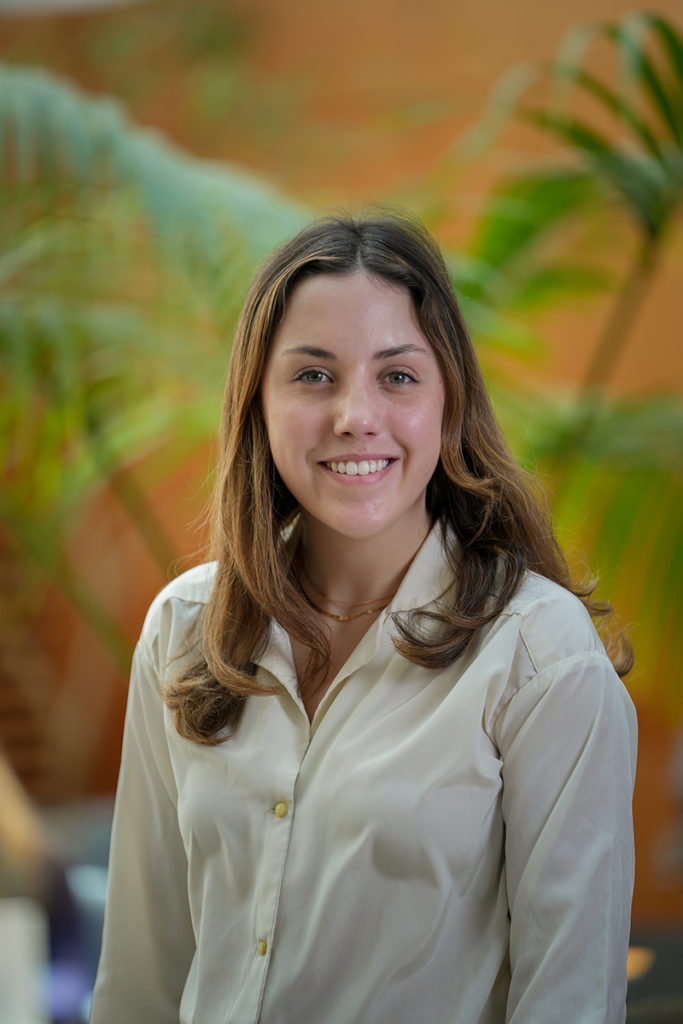A Graduating Senior’s Journey Includes Three National Awards and Discovering a New Destination

When Claire Benedict ’23 of Ada, Michigan, was a student at Forest Hills Eastern High School engaged in the college search, it didn’t take long for Hope to make the top of the list.
“I wanted a really strong science program where I could do research starting as a freshman,” she said. “It was also important to me to grow in the Christian faith and study the liberal arts so that I could make good ethical and moral decisions in my career with that faith background.”
Hope has turned out to be a good choice for Benedict, who graduated this May with majors in chemistry (the college’s American Chemical Society-certified Bachelor of Science degree) and Spanish. Her experiences the past four years helped her find her calling, and she is completing her undergraduate career having earned three major national awards supporting her interest in research, including two of the most prestigious available to recent college graduates.
As a junior in the spring of 2022, she received a $7,500 scholarship from the Barry Goldwater Scholarship and Excellence in Education Foundation for mathematics, science and engineering students — out of only 417 presented nationwide — for the 2022–23 school year.
“I wanted a really strong science program where I could do research starting as a freshman. It was also important to me to grow in the Christian faith and study the liberal arts so that I could make good ethical and moral decisions in my career with that faith background.”
Claire Benedict ’23
This spring, she received both an award through the Fulbright U.S. Student Program sponsored by the U.S. Department of State to conduct research abroad for the coming year, and a National Science Foundation Graduate Research Fellowship, the latter of which provides financial support for graduate students in STEM (science, technology, engineering and mathematics) fields.
It’s a significant achievement for a graduating college senior or recent graduate to receive either, let alone both. There aren’t statistics available for the number of Fulbrights this year, but the NSF has only awarded 2,552 of the research fellowships, with another 801 applicants receiving honorable mention. (Hope students and graduates, not incidentally, are consistently recognized through the programs. As noted in the sidebar below, Benedict is one of three from Hope to have received Fulbright recognition this year, and one of five to receive either a fellowship or honorable mention from the NSF.)
As it happens, recipients of both may only accept one of the two. Benedict has chosen the Fulbright, through which she will conduct research in Switzerland during 2023–24, and has the opportunity to apply again for an NSF Graduate Research Fellowship next year. She will begin graduate work at the University of Chicago in the fall of 2024.
Hope provided the opportunities that helped lead to the recognition that Benedict has received, but she made the most of them. She participated in collaborative research throughout her time at Hope, including part-time during the school year and full-time during the summer.
As a freshman, she worked with Dr. William Polik, who is the Edward and Elizabeth Hofma Professor of Chemistry, performing an in-depth analysis of laser and optical systems part-time during the school year and full-time during the summer that followed. Already in her first year, he noted, she stood out.
“Claire is very dependable, self-confident and self-motivated,” he said. “She communicates and interacts well with others. She sets high goals for herself, and works diligently to achieve them.”
“I am most impressed with Claire’s independence in the lab, her enthusiasm for learning new things, and her willingness to take on challenges,” Polik said.
From her sophomore year onward, Benedict worked primarily with Dr. Jeffrey Johnson, professor of chemistry, during both the school year and summer. The research focused on reaction development using carbon-carbon bond activation, where carbon bonds are broken to create new reaction pathways.
During the spring of 2022, she participated in off-campus study in Seville, Spain, during which she worked in the laboratory of Dr. Agustin Galindo, a member of the organic chemistry faculty at the University of Seville. She helped develop metal complexes derived from amino acids that have antibacterial properties.
In addition to collaborative research, Benedict’s activities at Hope included tutoring, serving as a teaching assistant, playing piano, participating in bilingual activities, and the college’s intercollegiate indoor and outdoor track and field teams.
Claire Benedict’s experiences at Hope the past four years helped her find her calling, and she is completing her undergraduate career having earned three major national awards supporting her interest in research. As a junior, she received a scholarship from the Barry Goldwater Scholarship and Excellence in Education Foundation for mathematics, science and engineering students. This spring, she received both an award through the Fulbright U.S. Student Program sponsored by the U.S. Department of State to conduct research abroad for the coming year, and a National Science Foundation Graduate Research Fellowship.
Interested in making a difference to others, Benedict had started out pre-med, complementing her chemistry major with Spanish so that she could more effectively serve a variety of communities. But, she enjoyed conducting research so much that she changed her focus, realizing at the same time that researchers — and the progress and benefits to humankind and the world that they make possible — make a difference, too.
“When I wanted to be a doctor, it was because I wanted to do something to positively impact people and that would be difficult and challenge me,” she said. “Once I started in research, I realized how challenging that was and how it aligned with my gifts, and that it was also a way that I could have a positive impact on people.”
Her career goal is to earn a Ph.D. in organic chemistry and conduct research in organometallic chemistry at a national laboratory. While in Switzerland, she will work with Dr. Martin Albrecht, who is a professor of inorganic chemistry at the University of Bern, optimizing and developing Iridium-based dehydrogenation catalysts. When she enrolls in the Ph.D. program at the University of Chicago, which awarded her its Robert R. McCormick Fellowship, she will conduct research focused on fundamental organometallic mechanisms.
With her time at Hope concluding and her journey to follow about to begin, Benedict is asked what advice she would give to current high school students considering or about to start at Hope. The answer comes easily.
“I just hope that people would get involved with research just because it’s a great opportunity here,” she said.
“You don’t have to become a research chemist — there are all kinds of disciplines where you can do research,” Benedict said. “I was just at CURCA [the college’s Celebration of Undergraduate Research and Creative Activity, held in April] and saw every kind of research discipline, which is really, really cool.”
Established in 1946, the Fulbright U.S. Student Program provides opportunities for students and young professionals to undertake international graduate study, advanced research, university teaching, and primary and secondary school teaching worldwide. The program awards grants annually in all fields of study, and operates in more than 140 countries worldwide.
The NSF’s Graduate Research Fellowship Program is the country’s oldest fellowship program that directly supports graduate students in various STEM fields, and was established as the first program in the NSF’s history. Since 1952, the NSF has funded more than 60,000 Graduate Research Fellowships out of more than 500,000 applicants. The awards provide a three-year annual stipend of $37,000, along with a $12,000 cost-of-education allowance for tuition and fees.
Hope students and recent alumni have consistently been among the Fulbright and NSF-GRF honorees. Since 2004, 42 have received Fulbrights, most for English teaching assistantships but some, like Benedict, for research, with several others named alternates or semi-finalists. In the same period, 41 have received NSF Graduate Research Fellowships, with another 40 receiving honorable mention.
This year, Jessica Korte ’19 also received an NSF fellowship, supporting her doctoral studies in biomedical engineering at the University of California, Davis, with honorable mention recognition for Sarah Grimes ’23, who will pursue a Ph.D. in forestry and natural resources at Purdue University; Erik Schoonover ’21; who is pursuing a Ph.D. in petrology at Pennsylvania State University, University Park; and Jacob VanderRoest ’21, who is pursuing a Ph.D. in chemistry, focused on ecological sustainability, at Colorado State University.
In this year’s Fulbright U.S. Student Program, Justine Watson ’22 was named an alternate for a master’s degree program in business in Italy; Molly Douma ’22 was recognized as a semi-finalist for a research grant in interdisciplinary studies in Peru; and Gabrielle Kosiba ’23 was recognized as a semi-finalist for an English teaching assistantship to South Korea.


